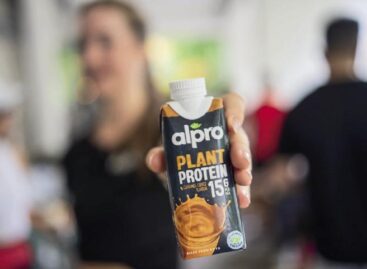10th Zsendülés horticultural conference: operational times
On 27-28 February the representatives of the horticulture sector gathered in Szeged for the Zsendülés conference, organised by Kert-Ész Club Hungary Association.
This article is available for reading in Trade magazin 2025/5.
József Rácz, president of the association welcomed participants and Minister of Agriculture Dr István Nagy opened the conference.
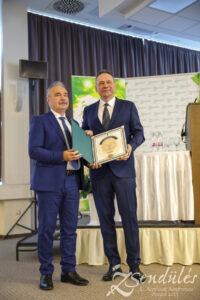
The Minister of Agriculture of Hungary has awarded a jubilee certificate to the Kert-Ész Club Hungary Association on the occasion of the 10th Zsendülés Horticultural Conference. The award was received by József Rácz, President of the Club
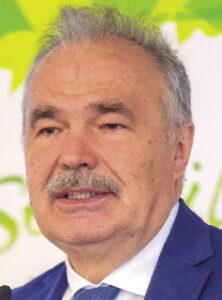
Dr. István Nagy
minister of agriculture
He underlined that the horticulture sector has become a thriving, well-organised industry that found its way into the retail trade. The key to this wasn’t only technological development, but also the fact that producers joined forces and cooperated.
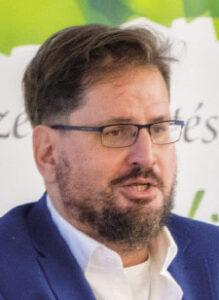
Dr. Zoltán Pogátsa
economist
The next speaker was economist Dr Zoltán Pogátsa, who took a look at the indicators of the Hungarian economy, from which some are worrying while others are less so.
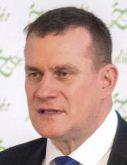
Sándor Baja
managing director
Randstad Hungary
Sándor Baja, managing director of Randstad Hungary Kft. told that last year the demand for temporary workers fell by 20% in Hungary.
In addition to the speakers, the participants of the first round table discussion were Szabolcs Szigeti, deputy state secretary for the implementation of the Common Agricultural Policy at the Ministry of Agriculture, Sándor Nagypéter, president of the Southern Great Plain Horticulture Cooperative, Dr Ferenc Apáti, president of the FruitVeb Interprofessional Organisation, Zoltán Gubacsi, managing director of Délplant Kft. and Imre Csizmadia, president of the of horticulture and supplier department of the Hungarian Chamber of Agriculture (NAK). During the discussion it was told that the sector’s interest is to cut the VAT rate for fruit and vegetables.
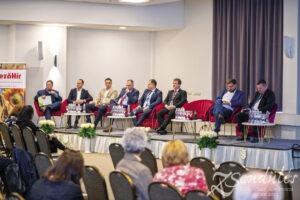
According to the first round table discussion, the sector would be more interested in reducing VAT on fruits and vegetables
Examples from abroad
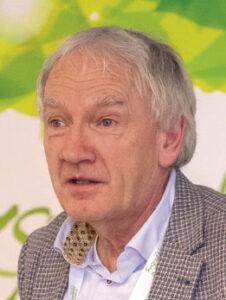
Peter Maes
director of transformation
Koppert BV
The conference continued with a European perspective. Peter Maes, director of transformation of Holland Koppert BV gave an overview of the changes that Dutch horticulturists have made to remain competitive. Their new platform focuses on 4 key themes: energy, crop protection, water and irrigation, and labour.
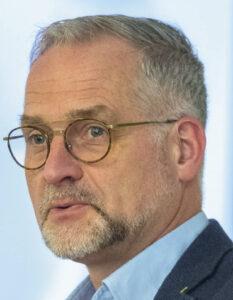
Willem Rodenburg
public affairs manager
GroetenFruit Huis
Willem Rodenburg, public affairs manager of the GroetenFruit Huis in the Netherlands – which has 270 members – introduced the EU’s internal market for fruit and vegetables. Added value is becoming increasingly important, with the focus on convenience and ready-to-eat products – but this also means that production costs are rising.
Next Knútur Friðheimar, the owner of Friðheimar Horticulture joined the conference online from Iceland, to speak about the daily life of a greenhouse farmer. He and his wife have been growing tomatoes in Iceland for 30 years. They rely on green energy, they use natural plant protection products and they also receive tourists.
In the second roundtable of the day the speakers were joined by Márton Bittsánszky, head of the agriculture market department of the Ministry of Agriculture and János Nemes Nagy, managing director of Nemeskert Kft. It turned out that the biggest problems are the quality of labour and its cost in Hungary.

Hungarian gardeners do a lot of things well, but they just don’t always communicate it well, the second roundtable discussion found
Vegetables are now performing better than fruit
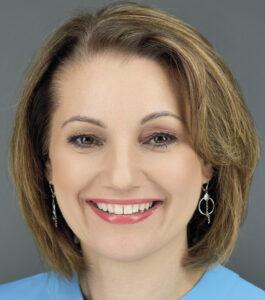
Tünde Turcsán
managing director
YouGov
In the afternoon the programme started with a market overview by Tünde Turcsán, managing director of YouGov. Households are trying to spend less and buy only the essentials – preferably in promotion. Discounters are strengthening in the fruit and vegetable category, while marketplaces have suffered a double-digit drop in volume sales. The product category accounts for 11-12% of the total basket.
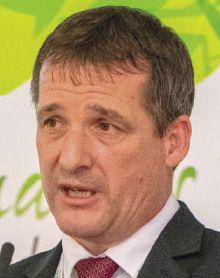
Dr. Ferenc Apáti
president
FruitVeb
Dr Ferenc Apáti, the president of FruitVeb spoke about the last 10 years of the sector, when it didn’t develop as expected: the foreign trade balance dropped from plus 100,000-150,000 tonnes to minus 100,000-150,000 tonnes – a value of HUF 50bn.
From horticulture farms to the shopping baskets
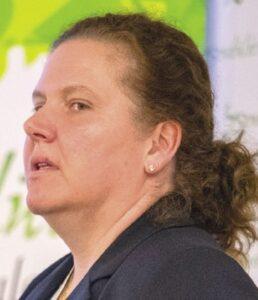
Melinda Makránszky
strategic buyer
Auchan Magyarország
Melinda Makránszky, strategic buyer (fruit and vegetables) of Auchan Magyarország spoke about the retail chain’s expansion plans. Auchan’s vision until 2035 is to make healthy and environmentally friendly products attractive and affordable. Currently Auchan buys 52% of their fruit and vegetable products directly from producers – a percentage they want to increase.
This part of the conference ended with a the third roundtable discussion, which was attended by the speakers and Tamás Lengyel, managing director of Garten Kft., Zoltán Ujszászi, senior buyer of fruit and vegetables at Tisza – COOP Zrt., Tamás Feczák, managing director of Hódkertész Kft., István Ecsedi, head of the food safety department of the National Authority for Trade and Consumer Protection (NKFH), Gábor Bozány, technical director of the Budapest Wholesale Market, Dr András Kálmán, foreign trade manager of the Southern Great Plain Horticulture Cooperative and József Katona, international sourcing manager for fruit and vegetable at ASPIAG Austria-SPAR-International AG. They discussed the functioning of the new control agency, NKFH, digitalisation and AI.
The professional programme concluded with a conversation between presenter and motivational speaker Szilvia Krizsó and clinical psychologist and writer Dr Kitti Almási.
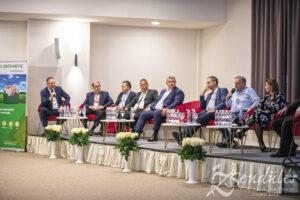
Both government and chains’ expectations of the sector were discussed at the third round table
Operational programmes in Hungary and abroad
Friday was the day of Producer Sales Organisations (TÉSZ), with a focus on operational programmes.
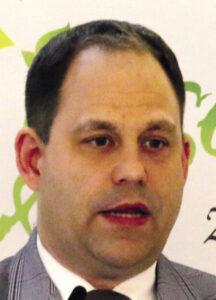
Sándor Nagypéter
president
Southern Great Plain Horticulture Cooperative
The first speaker was Sándor Nagypéter, president of the Southern Great Plain Horticulture Cooperative, who told that the 2023-2029 period could be a time for great development for producer sales organisations, as in addition to EU funding national support will also help in capacity building, technological and digital development. The budget of the 7-year operational programme submitted by the cooperative is HUF 31bn.
Willem Rodenburg, public affairs manager of the GroetenFruit Huis and the Dutch Produce Association (DPA) introduced the Dutch producer sales organisations. DPA has 11 TÉSZ members, who represent 75% of Dutch fruit and vegetable production.
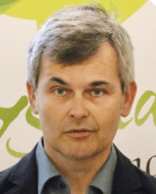
Ing. Peter Turlík
managing director
Ovocinárske družstvo
Bonum
Peter Turlik, managing director of Ovocinárske družstvo Bonum from Slovakia gave a presentation about their fruit cooperative, established in 2002. Bonum has 17 members and grows mainly apples. He named three main challenges for the future: the weather, high labour costs and consistent communication to retail trade, explaining that their main goal isn’t being cheap, but offering good quality, local produce at prices that is right for them.
Next there was a roundtable discussion, which also included Albert Wassink, adviser to the Rijksdienst voor Ondernemend Nederland (RVO), Ondrej Kardelis from the Agricultural Paying Agency of Slovakia and Márton Bittsánszky. They discussed practical issues of the operational programmes.
Who pays the farmer?
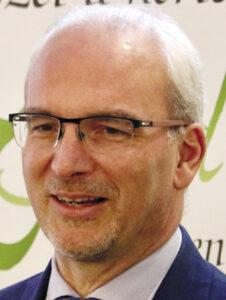
Márton Bittsánszky
head of agricultural market department
Ministry of Agriculture
After the coffee break Márton Bittsánszky talked about the types of interventions in the submitted operational programmes. A total of 42 operational programmes have been submitted, with a reference amount of HUF 100bn for 2025.
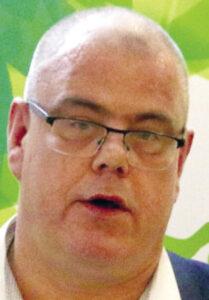
Albert Wassink
advisor
Rijksdienst voor
Ondernemend Nederland
Albert Wassink tried to explain the Dutch system to the participants, which wasn’t an easy task. In the Netherlands a distinction is made between multi-annual operational programmes and their more detailed annual breakdown, and the latter forms the basis for the actual financial support granted.
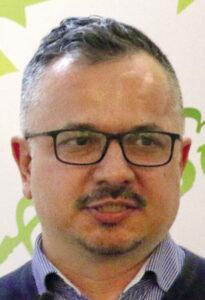
Ondrej Kardelis
staff member
Agricultural Paying Agency (Slovakia)
Ondrej Kardelis said that in Slovakia you have to submit an application, which is then accepted by the ministry. Next a payment application needs to be submitted. There is a minimum of 5 members and a threshold of EUR 500,000.
The final roundtable of the day was chaired by László Angyal, head of the market and national support department of the Hungarian State Treasury and Aranka Ujvári, member of the board of the Hungarian Fruit and Vegetable Producers Sales Organisations and Traders Association. The panel concentrated on payments and compared the thresholds below which tenders are simplified in each country and on how the independence and eligibility of bidders can be verified. //
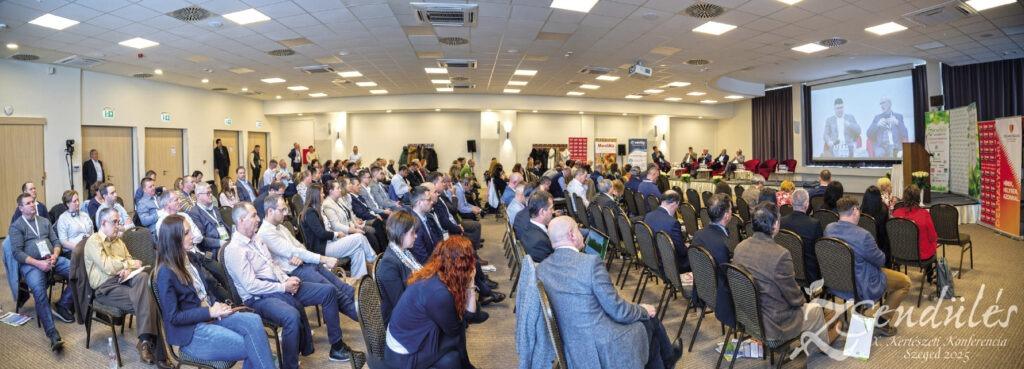
The renewal of the horticultural sector is underway, participants at the tenth Zsendülés conference concluded
Related news
From ham to egg dye – comprehensive Nébih inspection continues until Easter
🎧 Hallgasd a cikket: Lejátszás Szünet Folytatás Leállítás Nyelv: Auto…
Read more >AM: from ham to egg dye, comprehensive Nébih inspection is underway until Easter
🎧 Hallgasd a cikket: Lejátszás Szünet Folytatás Leállítás Nyelv: Auto…
Read more >Related news
Where wheat turns into flour and data: this is how the domestic milling industry is digitizing
🎧 Hallgasd a cikket: Lejátszás Szünet Folytatás Leállítás Nyelv: Auto…
Read more >High-protein products are taking over
🎧 Hallgasd a cikket: Lejátszás Szünet Folytatás Leállítás Nyelv: Auto…
Read more >








